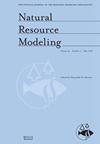环境税在指导全球气候政策以减缓欧洲地区气候变化方面的作用
IF 2.1
4区 环境科学与生态学
Q3 ENVIRONMENTAL SCIENCES
引用次数: 0
摘要
本研究旨在对环境税法对执行气候相关财政政策的影响进行实际调查。我们的研究将评估 2011 年至 2020 年期间 23 个欧洲国家环境税收措施的有效性。面板校正标准误差(PCSE)模型和可行的广义最小二乘法(FGLS)模型用于实证检验环境税法与气候相关金融措施的实施之间的联系。本研究基于具有横截面依赖性的面板数据。我们的估算结果凸显了通过使用全部四个生态税指标来提高政策有效性的必要性。这些指标包括环境税总收入、能源税收入、污染和资源税收入以及交通税收入。此外,我们还提供了实际证据,阐明了环境税收政策的实施在短期和长期内提高气候相关财政政策效力的过程。根据研究结果,三分之一的环境税收政策指标对气候相关财政措施的实施有长期影响,而没有短期影响。我们的研究结果对于支持将环境税作为促进国家气候政策实施的有效工具的经济学家和政策制定者来说至关重要。本文章由计算机程序翻译,如有差异,请以英文原文为准。
The role of environmental tax in guiding global climate policies to mitigate climate changes in European region
The purpose of this study is to perform a practical inquiry into the influence of environmental tax laws on the execution of climate‐related financial policies. Our research will assess the effectiveness of environmental tax measures in 23 European countries from 2011 to 2020. The panel‐corrected standard error (PCSE) model and the feasible generalized least squares (FGLS) model are used in the empirical examination of the link between environmental tax laws and the implementation of climate‐related financial measures. This study is based on panel data with cross‐sectional dependence. The results of our estimation highlight the need to improve policy effectiveness by using all four ecological tax indicators. These include total environmental tax revenue, energy tax revenue, pollution and resource tax revenue, and transportation tax revenue. Furthermore, we provide actual evidence clarifying the process by which the implementation of environmental tax policies improves the efficacy of climate‐related financial policies in the short term as well as the long term. According to the findings, a third of environmental tax policy indicators have a long‐term effect on the implementation of climate‐related financial measures, with no short‐term effects seen. Our findings are critical for economists and policy‐makers who support the environmental tax as an effective tool to promote a country's climate policy implementations.
求助全文
通过发布文献求助,成功后即可免费获取论文全文。
去求助
来源期刊

Natural Resource Modeling
环境科学-环境科学
CiteScore
3.50
自引率
6.20%
发文量
28
审稿时长
>36 weeks
期刊介绍:
Natural Resource Modeling is an international journal devoted to mathematical modeling of natural resource systems. It reflects the conceptual and methodological core that is common to model building throughout disciplines including such fields as forestry, fisheries, economics and ecology. This core draws upon the analytical and methodological apparatus of mathematics, statistics, and scientific computing.
 求助内容:
求助内容: 应助结果提醒方式:
应助结果提醒方式:


